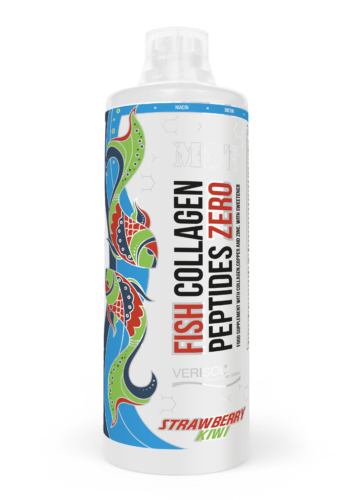
Collagen for Skin: Which One Do You Need?
One of the most unpleasant problems that women face is skin aging. Yes, of course, men face it too, but women suffer more from skin aging, and they go to various lengths to keep their skin firm and prevent wrinkles. So this article is addressed mainly to the fair sex.
Why Does Skin Age? Lack of Collagen!
Let me start a little far away and try to explain why the skin loses elasticity and becomes wrinkled over the years. With aging, the body produces fewer and fewer new cells – this is a basic truth. The production of connective tissue cells, fibroblasts, also decreases. And the fewer fibroblasts are produced, the less collagen and elastin proteins will be in the body.
Both collagen and elastin are extremely important for the skin – they provide its strength, allow the skin to restore its shape after stretching or compression. The less of them, the more flabby the skin will be. Collagen is also capable of retaining water: a decrease in its quantity means that the skin will become dry and wrinkles will start to appear.
There are factors that accelerate the process of skin aging. Smoking, air pollution, exposure to ultraviolet rays (how can we not remember the passion for a bronze tan!) – all this leads to even less collagen and elastin in the body. With all the ensuing consequences.
How to Slow Down the Aging Process of the Skin with Collagen?
It must be said right away: the aging process of the skin cannot be reversed or even stopped – it can only be slowed down, trying to soften the obvious signs of aging. What is needed for this? Exactly: it is necessary to ensure that collagen and elastin in our body do not decrease. That is, it is necessary to figure out how to replenish their deficiency.
Obviously, this can be done with the help of growth hormone: synthetic somatotropin stimulates the synthesis of collagen. Logic suggests that approximately the same – only weaker – effect can be achieved with the help of growth hormone secretion stimulants. This is almost all that can be done with pharmaceuticals.
But what if you try to replenish the collagen deficiency by simply taking it orally as a supplement? After all, quality somatotropin (and there is no point in trying to use another one) is far from affordable for everyone, and the need to make injections several times a day creates certain inconveniences.
Collagen supplements are both cheaper and more convenient, but how effective are they? It is precisely about supplements containing collagen and what they can really give, not in the imagination of their creators, that we will talk about further. And, of course, I will traditionally refer to research, especially since quite a lot of it has been found.
Types of Collagen for Skin in the Body
Collagen is a common protein. Ideally, when it enters the gastrointestinal tract (GIT), it should break down into amino acids – like all other proteins. Then what is the difference whether you took collagen or, say, drank whey protein – since both will enter the bloodstream in the form of amino acids, only their set will differ.
This gave many dermatologists a reason to argue that taking collagen supplements is pointless; Adam Friedman, a professor in the department of dermatology at George Washington University, was the most vehement opponent of their use. There were even several studies confirming the validity of the esteemed specialist. But it turned out that everything is not so simple.
There are mainly five types of collagen in the human body – they are designated by Roman numerals from I to V.
So, it was found that at least one of them – namely collagen type II – easily passes through the GIT without losing its chemical structure. That is, when taking collagen type II, collagen molecules are guaranteed to enter the bloodstream.
You can object to this: collagen type II is characteristic of ligaments and joints, and only collagens of types I and III are present in the skin. But it was later established that collagen type III is also minimally destroyed – and its molecules enter the bloodstream, mainly intact. But that’s not all.
What Do Studies Say About Collagen for Skin?
In 2012 and 2013, two studies were conducted, and their results were quite unexpected. It turned out that additional intake of collagen – of any type – stimulates the synthesis of this protein by the body itself! Moreover, additional intake of collagen also stimulates the synthesis of elastin – a protein that, I remind you, is no less important for the skin than collagen.
Thus, a solid foundation was laid for the use of collagen in the form of supplements, and then the “construction of the main building” began. Here are the results of a study conducted in 2014: “In women who took two and a half to five grams of collagen daily in the form of a supplement for eight weeks, the skin was noticeably healthier and more elastic than in those who did not take supplements.”
Two more studies, the results of which can be summarized as follows: “The hydration of the skin of women who took liquid collagen for 12 weeks improved, and the depth of wrinkles noticeably decreased – the skin smoothed out.” The first is dated 2014, the second – 2015.
There were many more studies, and their results were close to those I cited. Summarizing all of them, we can say that taking supplements containing collagen is very likely to improve skin hydration and elasticity, as well as reduce the number and depth of wrinkles.
There are suggestions that collagen supplements help prevent acne, but it is too early to say anything definite about this. As is usually said in such cases, additional research is needed.

How to Choose Collagen for Skin and How to Take It?
If you have not been lazy and read the names of the studies listed at the very end, you may have noticed that some of them mention “collagen peptides”. This is not a new development, but simply another name for hydrolyzed collagen (collagen hydrolysate).
The main three forms of collagen are:
- Hydrolyzed collagen (collagen peptides)
- Undenatured collagen
- Gelatin
If the health and well-being of your skin are on your agenda, you should buy only collagen peptides. As for the daily amount of collagen, two and a half grams of collagen are enough for skin health. Although this amount can be increased to five grams – this way, you will get some additional benefits. There is no point in increasing the daily dose of collagen any further.
For residents of Ukraine and Europe, quality collagen supplements can be purchased from MST Nutrition, which has established itself as a reliable supplier.

How to Properly Take Collagen?
Collagen supplements are recommended to be taken in courses of 3 months, followed by a break of the same duration. In my opinion, this makes no sense: why interrupt the intake of what stimulates the synthesis of your own collagen? Moreover, there is a very recent study (6) proving that continuous intake of collagen supplements is completely safe.
And here is what you should pay special attention to: collagen synthesis is impossible if there is a vitamin C deficiency in the body. Therefore, it is better to buy a supplement that contains both collagen and vitamin C, or simply take about 1 gram of vitamin C per day as a separate supplement.
Supplemental collagen can slow down the aging process of the skin, but it cannot reverse this process. This needs to be understood, and you should not expect any extraordinary miracles. And it is best to start taking collagen supplements as early as possible – this way, you will keep your skin healthy and firm for longer.
List of Studies
- Ruta Ganceviciene, Aikaterini I. Liakou, Athanasios Theodoridis, Evgenia Makrantonaki, and Christos C. Zouboulis. Skin anti-aging strategies. Dermatoendocrinol. 2012 Jul 1; 4(3): 308–319.
- E Proksch, Michael Schunck, V Zague, Dörte Segger. Oral Intake of Specific Bioactive Collagen Peptides Reduces Skin Wrinkles and Increases Dermal Matrix Synthesis. December 2013 Skin Pharmacology and Physiology 27(3):113-119.
- E Proksch, D Segger, J Degwert, M Schunck, V Zague, S Oesser. Oral supplementation of specific collagen peptides has beneficial effects on human skin physiology: a double-blind, placebo-controlled study. Skin Pharmacol Physiol. 2014;27(1):47-55.
- Maryam Borumand and Sara Sibilla. Daily consumption of the collagen supplement Pure Gold Collagen® reduces visible signs of aging. Clin Interv Aging. 2014; 9: 1747–1758.
- Maryam Borumand, Sara Sibilla. Effects of a nutritional supplement containing collagen peptides on skin elasticity, hydration and wrinkles. 2015 Journal of Medical Nutrition & Nutraceuticals, vol. 4, issue 1, p.47-53.
- Cristiana Paul, Suzane Leser, Steffen Oesser. Significant Amounts of Functional Collagen Peptides Can Be Incorporated in the Diet While Maintaining Indispensable Amino Acid Balance. Nutrients. 2019 May 15;11(5):1079.
Article author: Yuri Bombela




 +38 050 933 51 60
+38 050 933 51 60 +38 093 369 29 10
+38 093 369 29 10